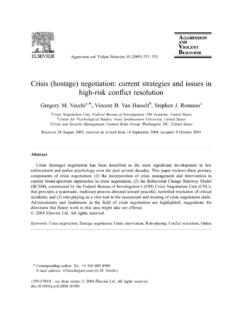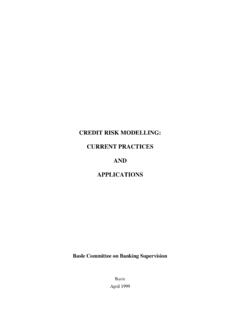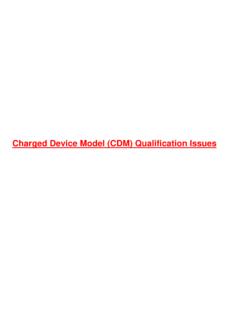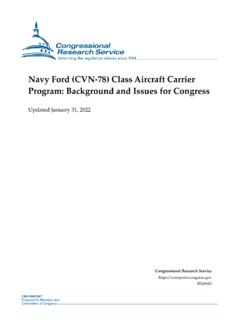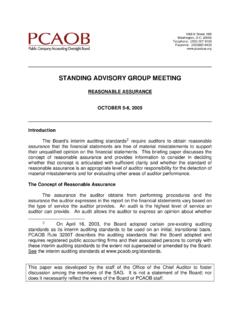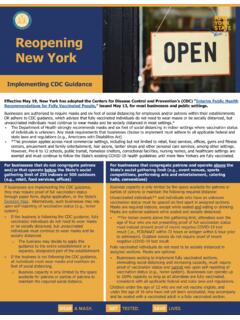Transcription of CURRENT ISSUES IN MATHEMATICS EDUCATION - COMAP
1 CURRENTISSUESINMATHEMATICSEDUCATIONMATER IALSOFTHEAMERICAN RUSSIANWORKSHOPMOSCOWSTATEPEDAGOGICALUNI VERSITYTEACHERSCOLLEGE, COLUMBIAUNIVERSITYNOVEMBER18 20, 2016 CURRENTISSUES INMATHEMATICSEDUCATIONMATERIALS OFTHEAMERICAN-RUSSIANWORKSHOPMOSCOWSTATE PEDAGOGICALUNIVERSITYTEACHERSCOLLEGE, COLUMBIAUNIVERSITYNOVEMBER18-20, 2016 Edited by Alexander KarpArticles by the following contributorswork is copyright 2017 Alexander KarpVladimir N. Dubrovsky, Vladimir A. BulychevSol GarfunkelIrina OvsyannikovaSergei A. PolikarpovAleksey L. SemenovVladimir Z. SharichDmitry E. ShnolErica N. WalkerNicholas H. WassermanPrinted in the : 1-933223-01-4 ISBN-13: 978-1-933223-01-8 Supported by the United States Department of State This publication was funded by a grant from the United States Department of opinions, findings and conclusions stated herein are those of the authors anddo not necessarily reflect those of the United States Department of StateSupported by the Eurasia FoundationThis publication is made possible by the support of Eurasia Foundation.
2 The contents are the responsibility of the authors and do not necessarily reflect theviews of Eurasia FoundationPublished by170 Middlesex Tpke., Suite 3B, Bedford, MA ..vReflecting on the CURRENT ISSUES in MATHEMATICS KarpMathKit and Math Practicum ..13 Vladimir N. Dubrovsky, Vladimir A. BulychevMaking Cultural Change ..29 Sol GarfunkelUsing Technology in MATHEMATICS EDUCATION ..39 Irina OvsyannikovaMathematical EDUCATION in Russia: Modern Approaches to Math Teacher Preparation ..45 Sergei A. PolikarpovImplementation of the Conceptual Framework for Russian Mathematical L. SemenovGoals and Challenges of Mathematical Olympiads of Today:Science, Sport, University Admission, or Status?..67 Vladimir Z. SharichMathematical Research Problems in Russian Schools ..79 Dmitry E. ShnolSome Political, Sociological, and Cultural ISSUES Related to MATHEMATICS Teaching and Learning in the United States.
3 95 Erica N. WalkerThe Dilemma of Advanced MATHEMATICS : Instructional Approaches for Secondary MATHEMATICS Teacher EDUCATION ..107 Nicholas H. WassermanNotes on Contributors ..125iiiPrefaceThe present publication comprises a collection of articles by the participants in theRussian-American workshop CURRENT ISSUES in MATHEMATICS EDUCATION , whichtook place on November 18-20, 2016 in New York. The workshop was organizedwith support from the Eurasia Foundation in the form of a grant presented to theMoscow State Pedagogical University and Teachers College, Columbia in the workshop included faculty from both institutions, as well as in-vited guests and colleagues, and doctoral and masters students of Teachers College,Columbia University. The collection opens with an introduction by Karp, fol-lowed by the articles in alphabetical order. Articles written in Russian were trans-lated into English for this publication (conversely, for the Russian edition, articlesoriginally in English were translated into Russian.)
4 The materials presented here mirror to a large extent the events of the cannot, however, capture the extensive discussions of the papers and theproblems they raised, which followed each of the presentations. A video recordingof the workshop is available for those interested in that aspect of the the same time, publication of the papers delivered by the principal participantswill likewise permit the reader to follow the discussion, as it were, by tracing thesimilarities and differences in the specific problems encountered in either be sure, the ISSUES named and discussed here do not make up an exhaustive EDUCATION today faces a host of challenges, and ideas concerning theirorigins and remedies are just as numerous. We must continue the discussion, facinghead-on the difficulties and setbacks. Neither shall we attempt to isolate ourselvesfrom the experiences of other nations, but rather try to use those experiences to ouradvantage wherever possible.
5 It is our hope that the materials presented here willprove useful in that would like to extend our sincere thanks to Julia DeButts, Sergey Levchin andJuliana Fullon for their assistance in organizing the workshop and preparing thematerials for Karpv1 Reflecting on the CURRENT ISSUES in MATHEMATICS EDUCATION Alexander Karp Teachers College, Columbia University This article, like the rest of the collection, considers the challenges facing MATHEMATICS EDUCATION . EDUCATION in general and MATHEMATICS EDUCATION in particular have always faced and will continue to face challenges: indeed, it could hardly advance save by overcoming difficulties, some of which go back thousands of years, yet when students complained of the hardships of learning, and teachers complained of students laziness.
6 To be sure, every age also ushers in its own particular problems, its own ways of dealing with problems old and new, and its own accomplishments. At the same time some problems may be regarded as universal, not associated with a particular region (even if they are manifested differently in different parts of the world), while some problems are endemic to particular regions and countries. In the present volume we intend to reflect the state of affairs in two countries: the and Russia. The contribution of these two nations (despite their many differences) to the international advancement of MATHEMATICS and technology is evident. It seems well worthwhile, therefore, to compare the different perspectives of people engaged in MATHEMATICS EDUCATION in these two countries.
7 In this introduction we will present a general overview of the emerging challenges, which will be discussed in greater detail in subsequent essays. It should be noted straightaway that many of today s changes and challenges manifest itself in many spheres at once, consequently their discussion will invariably spread to several sections. Two of these changes deserve special mention: rapid technological advancement and fundamental social change. The first is obvious. Today s student, whether in Russia or in the , will not be taking notes in the classroom, preferring instead to record the lesson on his phone, or she will complain that the lesson does not come with a slide-show 2 presentation that could at least be photographed, since (horror!) it was not posted to the Internet.
8 One Russian author (Suvorov, 1993) has given a very personal account of learning to sell watermelons as a child, for which purpose he was furnished with a table, telling him how much to charge for per weight of watermelon (in 50 gram increments). These days one could hardly find such a thing: everyone has a calculator. American schools tell their students in all earnestness to look on the Khan Academy website ( ), where they will find all the classroom materials explained (presumably better than it had been done by the teacher). Technological progress has influenced not only the forms and methods of instruction, but also its content and philosophy. Social changes are less obvious and more ambiguous.
9 There is no question that the number of MATHEMATICS students across the world has grown considerably over the past century. But it is also true that even today not everyone gets to study MATHEMATICS , to say nothing of basic literacy. Still, that is not a problem one faces in Russia or in the , where for some decades now all children are formally instructed in MATHEMATICS . Yet there is disparity to be found at a deeper level: a student in a prestigious private school in New England and her peer at a village school in Siberia, or a girl from a school in South Bronx and a boy from a specialized lyc e in Moscow are all taught MATHEMATICS , but the knowledge they end up with is very different indeed. Changes in the regard are happening very rapidly, and not always in ways that increase the opportunities of all children.
10 Social processes are, moreover, paralleled, as it were, by discussions of these same processes, which often function as a kind of echo chamber. In any event, there is a clear recognition of the problem and, consequently, of the need for a solution. When discussing contemporary social and socio-political phenomena, we cannot gloss over organizational ISSUES , including questions of authority (educational, among others), and the initiatives, as well as their interplay, of various groups involved in MATHEMATICS EDUCATION . All of this may seem at first to be somewhat removed from what takes place in the classroom, and yet its influence on the actual classroom experience is profound. In what follows we will discuss various concrete manifestations of the described changes and problems.








